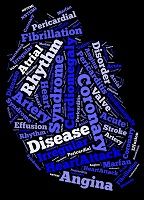Article
Slight Blood Pressure Rise Linked to Atrial Fibrillation Risk
Author(s):
An analysis of medical records from 5,311 people indicates that even mildly elevated blood pressure may indicate a dramatically elevated risk of developing atrial fibrillation (AF). Many studies have shown that patients with hypertension - defined as blood pressure above 140/90 mm Hg - are more likely to develop AF than patients with healthy blood pressure, but the new paper may be the first to document a significant association between AF and blood pressure between 120/80 mm Hg and 139/89 mm Hg.

An analysis of medical records from 5,311 people indicates that even mildly elevated blood pressure may indicate a dramatically elevated risk of developing atrial fibrillation (AF).Many studies have shown that patients with hypertension — defined as blood pressure above 140/90 mm Hg — are more likely to develop AF than patients with healthy blood pressure, but the new paper may be the first to document a significant association between AF and blood pressure between 120/80 mm Hg and 139/89 mm Hg.
Wesley T. O’Neal MD, and colleagues at the Wake Forest School of Medicine in Winston-Salem, NC used data from the Multi-Ethnic Study of Atherosclerosis to see how well blood pressure predicted the onset of AF over a median follow-up of 5.3 years. They found that people with sustained “prehypertension” were 80% more likely than those with optimal blood pressure (below 120/80 mm Hg) to be diagnosed with AF.
Despite the large number of patients in the cohort, the analysis barely achieved statistical significance. Only 182 patients of any kind (3.4%) developed AF, so while the observed effect of prehypertension was dramatic, the 95% confidence interval (CI) of the actual hazard ratio (HR) was wide: 1.004 to 3.2.
Still, the study authors wrote in the Journal of the American Society of Hypertension, the numbers are the best available and they support a single conclusion: “Sustained pre-hypertension is associated with an increased risk of AF.”
The research team also crunched the numbers for people with true hypertension and found that such patients faced an even greater risk of developing AF (HR, compared to those with optimal blood pressure, 2.6; 95% CI, 1.6 to 4.4). Those numbers are consistent with findings from numerous studies conducted in recent years.Indeed, researchers have long known of the strong association between hypertension and AF, and, although they haven’t definitively proven that high blood pressure can cause heart arrhythmias, they have established a chain of associations that suggests causation to many.
The authors of a much-cited article in the American Journal of Cardiology explained the progression more than a decade ago: “Hypertension is associated with left ventricular hypertrophy, impaired ventricular filling, left atrial enlargement, and slowing of atrial conduction velocity. These changes in cardiac structure and physiology favor the development of atrial fibrillation, and they increase the risk of thromboembolic complications.”
Of course, most people with hypertension never develop AF, so researchers have worked to determine which co-factors are associated with greater risk.
Different studies have focused on different possibilities, but age and heart structure appear in many of them: the older the patient and the heavier the atrium, the greater the association between hypertension and AF.Some researchers have argued that the association between hypertension and AF suggests that blood pressure management should be a major consideration in the treatment of AF, but research has yet to establish optimal blood pressure levels for people with AF.
Many patients with AF do receive medications designed to lower blood pressure because they have also been diagnosed with hypertension. Doctors do not, however, typically prescribe blood pressure medication to AF patients who do not otherwise qualify for treatment.Evidence of a significant link between prehypertension and AF could spur more research into such a strategy.





